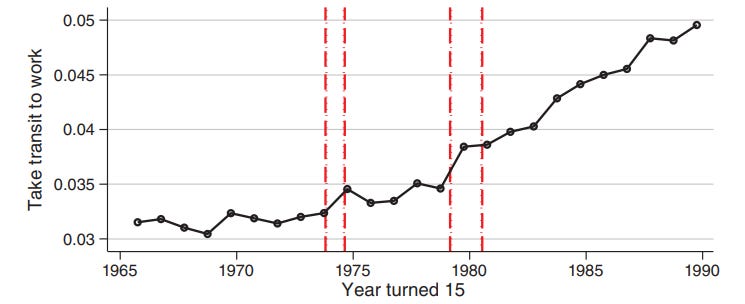Good news for public transport
Personal experiences are incredibly important in explaining the choices we make throughout our lives. I have written here about some examples of how the experiences we make in our youth (in particular during our formative years between age 16 and 24) influence our attitudes toward politics and investments forever. The pandemic has provided another texting ground for the influence of recessions on our political choices as I explained here.
Now the energy shock of the last couple of months will give us an opportunity to test another one of these lifetime influences. And it’s good news for the environment and public transportation providers.
Christopher Severen and Arthur van Benthem tested the reaction of people to the oil shocks of the 1970s. Specifically, they looked at the driving habits of people who were aged 15 and about to qualify for their driving licence in the United States during these oil crises. They found that for the rest of their lives, these people whose initial experience with driving a car was that it is bloody expensive decided to use the car less frequently and public transportation more often. In particular, they more frequently used public transportation instead of their car to commute to work and they were less likely to own a car than people of other cohorts.
Use of public transportation for commuting
Source: Severen and van Benthem (2022). Note: Red bars indicate the oil crises of the 1970s.
Overall, there has been a long-standing trend for Gen X, Millennials to use public transportation more often and rely less on the car. This trend has only increased with the arrival of the environmentally conscious Gen Z.
But the energy crisis of this year will likely convince more people to use buses and trains to get to work and think about replacements for their cars. Today, middle- and high-income households can choose to go electric and the latest statistics on new car registrations in the UK show that this is clearly a trend. In March 2022, the number of new cars registered in the UK dropped 14.3% compared to a year ago. But the number of hybrid electric vehicles sold increased by 28.4% and the number of battery electric vehicles by 78.7%. About three times as many electric cars were sold in the UK in March as Diesel cars. In fact, Britons bought more battery electric cars in March 2022 alone than in the whole year 2019.
And the government recently allocated the £7bn funds for the Bus Back Better programme (I didn’t come up with that name) that invests in better bus transportation links across the country. If there is one good thing coming out of the current energy crisis it is that it will accelerate the decline of the internal combustion engine car.




